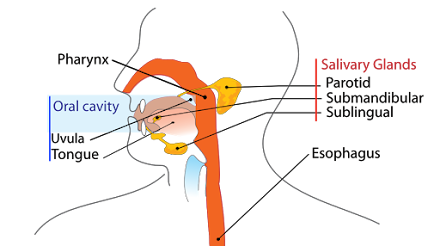April 12 through the 18th is oral, head, and neck cancer awareness week. This includes cancers in the oral cavity, nasal cavity, sinuses, lips, salivary glands, throat and larynx. The National Cancer Institute reports these cancers account for 3% of all cancer cases in the United States. These cancers are closely related to where food and beverage are ingested, modified and moved.
Changes in nutrition intake, calorie consumption, and hydration may lead to decreased weight and muscle mass, increased infection, delayed treatment and unplanned hospitalization. Individuals with head and neck cancers carry one of the highest rates of malnutrition among all cancer diagnoses with 25 to 50% of these people at risk for malnutrition prior to starting treatments. Treatments can trigger additional issues such as difficulty swallowing, sore mouth, changes in taste and smell, dry mouth, and nausea
With this type of cancer treatment is important not to be interrupted. For every day that radiation is interrupted control rate is 1% reduced. Weight loss as small as 6% predicts a reduced response to oncology treatment, reduced survival and reduced quality of life.
This broad category of cancers normally does not include the brain. It does include all other tissues from the neck up. Highly sensitive areas such as glands and membranes are often exposed to higher levels of pathogens, toxins and other substances through eating and breathing. Specific cancers include:
- Cancer of the mouth cavity
- Tongue
- Lip
- Any area of the throat cavity
- Voice box (larynx)
- Thyroid
- Rarer cancers can occur in the:
- Sinuses
- Salivary glands
- Inner ear
As always any unusual changes or experience unexplained discomfort anywhere on your body you should seek advice from the doctor. The most common symptoms of oral, head and neck cancers include:
- Persistent white or red sores or patches in the mouth.
- A change in the sound of your voice.
- A persistent sore throat.
- Earache, particularly when it occurs on only one side.
- Mouth ulcers that last more than a few weeks.
- Swelling or a lump anywhere.
- Pain or numbness anywhere.
- Nosebleeds.
- Loose teeth.
Don't immediately panic if you do have any of these symptoms. In most cases there is another, simpler cause. As always there are risk factors that increase your chance of getting any cancer and these include:
- Alcohol use
- Tobacco use (smoking, chewing or any other form)
- Human papillomavirus (HPV)
- Excessive sun exposure
- Chemical exposure
- Family history of such cancers

























